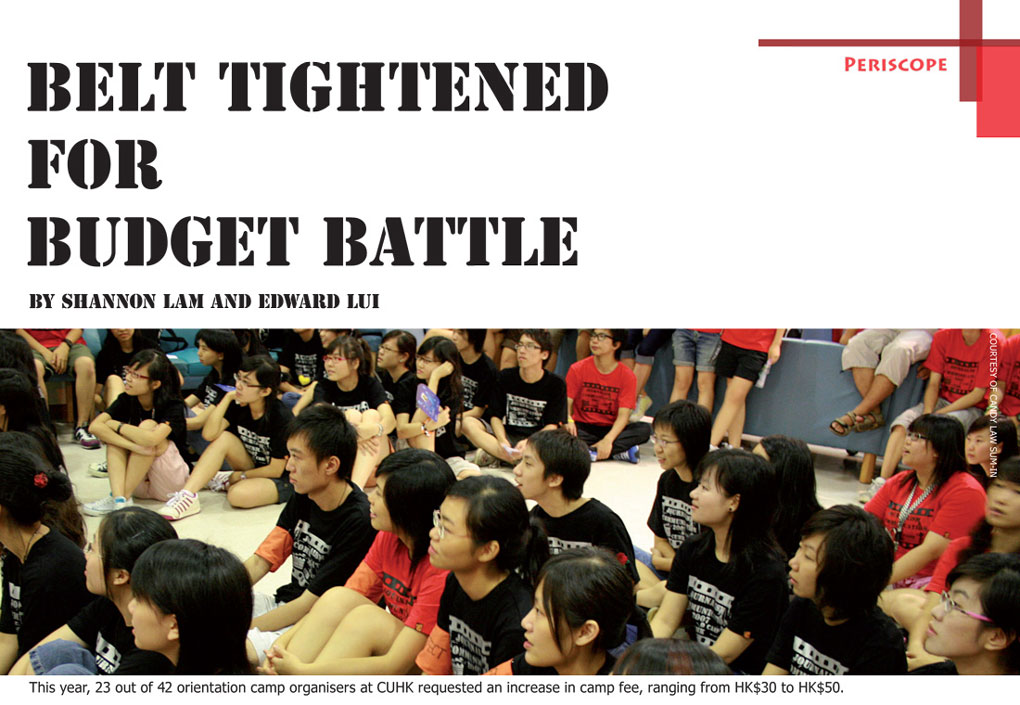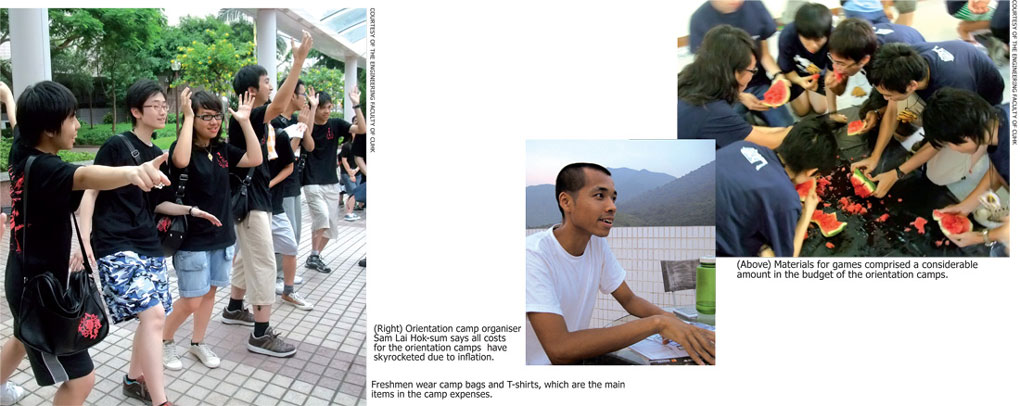
Tropical storm Kammuri, which hit Hong Kong in the past summer, unexpectedly ¡§saved¡¨ the student organisers of the orientation camp for the Faculty of Engineering, Chinese University of Hong Kong (CUHK) from running a deficit, likely happened in the recent months of rising prices.
Otherwise, each of the orientation camp student organisers had to pay, out of their own pocket, HK$200 to HK$300 for the deficit.
University students have had their first taste of fighting severe inflation in organising orientation camps when hostel fees, meals plans and many other expenses have soared.
¡§All costs have skyrocketed due to inflation,¡¨ said Sam Lai Hok-sum, organising committee chairman of the orientation camp of the Faculty of Engineering in CUHK.
¡§The most expensive parts are the meals, which accounts for HK$80,000 out of HK$200,000 of our budget,¡¨ said Lai, while the hostel fee per person per night has increased from HK$30 last year to HK$35, a rise of over 15 per cent.
No funding is provided by the university. Fee paid by freshmen covered most of the orientation camps revenue.
In order to solve their financial problems, the student organisers introduced some cost-cutting measures.
¡§We changed colour-print camp books to black-and-white and invited an entertainer who costs us less,¡¨ said Lai.
Having an event by an entertainer has long been the highlight of their orientation camp. The arrival of Typhoon Kammuri consequently led to the cancellation of this event and all students had to stay in their dormitories and had take-away food for dinner. Cost was then greatly reduced.
Even if the Typhoon Kammuri had not hit Hong Kong, the organisers could barely maintain a balanced budget.
Meanwhile, at the University of Hong Kong, Wong Yu-mei, the person-in-charge of Lady Ho Tung Hall orientation camp also had a tight budget for organizing the camp.
¡§The budget is almost as same as that of the past few years, but this year the expenses on meals and printing camp books has increased,¡¨ said Wong.
According to Wong, besides meals, camp tees and materials for games and activities are the main items in the expenses. No funding or subsidy is provided from the university and the expenses are covered by the camp fee , which is HK$800 for each freshman, and the contribution from organisers or helpers, who paid about HK$400 each.
Student organisers, though enthusiastic in helping out for the camp, felt that the rising prices had been a burden to them.
¡§I spent HK$4, 000 to HK$5, 000 for orientation camp this summer,¡¨ said Ho Wan-wai, a second year student of Information Engineering at CUHK. He was also one of the ¡§group fathers¡¨, or executive committee members for the orientataion camp of the faculty. ¡§That is definitely a burden.¡¨
In light of the surge in costs, 23 out of 42 orientation camp organisers of CUHK had asked for an increase in camp fee to cover their expenditures, ranging from HK$30 to HK$50.
Eventually, the Joint Committee on New Student Orientation of CUHK, which coordinates all the orientation camps, standardized the amount of camp fees at HK$600.
Chairman of the Joint Committee, Dennis Ng Kee-pui said: ¡§We understand the pressure facing by student organisers, but we have to monitor the ceiling of camp fees. Otherwise, the burden will be shifted to the freshmen.¡¨
Professor Ng added: ¡§Some of the expenses are not necessary, such as the cost of gifts and taxi fees after a late-night dinner.¡¨ He said that the camp fees of other universities are lower than CUHK.
Freshmen joining both college and faculty orientation camps in CUHK would need to pay over a thousand dollars. ¡§Some of them complained indirectly that the fees were too expensive,¡¨ said Professor Ng.
Despite the difficulties they faced, Professor Ng said that students could actually learn how to balance the budget and the quality of orientation camps at the same time.
At the same time, local non-governmental organisation (NGO) for young people, the Roundtable Community, is also showing signs of distress because of insufficient funding.
¡§Last year, we had a balanced budget. Yet, we have to bear about 20 per cent of the total cost this year,¡¨ said Ian Li Chi-fai, general manager of the Roundtable Community, when talking about its annual activity, the Global Elite Project, which is open to senior secondary students, aiming to inspire their global vision by understanding international issues.
Mr Li said: ¡§This is because the costs of meal plans, camp tees and rental of camp sites have all increased.¡¨ About one third of the budget was spent on renting the camp site.
Like other NGOs, the group has asked for sponsorship from charities and private organisations. ¡§Roundtable is still a rather new organisation, and so few are willing to help,¡¨ said Mr Li.
According to Mr Li, ways of sponsorship vary under different economic conditions.
¡§When there is severe inflation, like this year, companies tend not to sponsor us (with money),¡¨ said Mr Li. After many attempts, AM730, a local free newspaper, agreed to be their ¡§media partner¡¨ to help increase their media exposure.
¡§In terms of partnership, the commercial organisations offer a helping hand in an actual and solid way,¡¨ Mr Li said.
They also found the rigid process in applying for government funding does not fit their type of operation.
Gary Tang Kin-yat, Vice-Table Host for the Roundtable Community, said that the government can actually grant them a considerable sum of money.
However, the process from handing in the application to distributing the funding to them takes too long time. ¡§There are too many uncertainties during the long process,¡¨ said Mr Tang.
Natural Network, an NGO promoting environmental awareness among students from primary and secondary schools, also encountered difficulties in soliciting sponsorship.
They are often requested to provide statistical evidence to show the effectiveness of their objectives to their potential sponsor.
Mok Ho-kwong, 26, coordinator of the organisation said: ¡§We tried to seek help, but it was all in vain. For activities with measurable results, applying for funding is easier.
¡§However, for us, it is difficult to measure the changes of children¡¦s attitude towards environmental protection,¡¨ Mr Mok said. 
